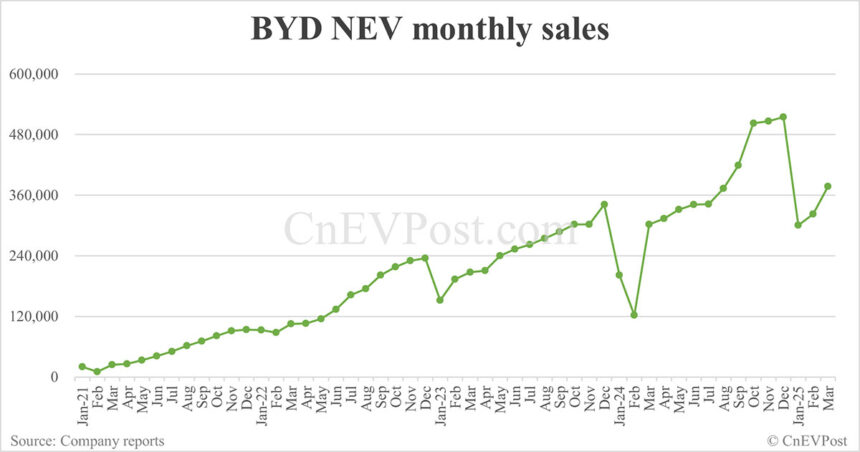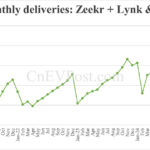BYD (HKG: 1211, OTCMKTS: BYDDY) achieved a remarkable milestone in March by selling a record 72,723 vehicles overseas, marking an 89.22 percent increase from the previous year and a further 8.50 percent rise from the previous month. The company’s total sales of new energy vehicles (NEVs) in March reached 377,420 units, reflecting a 24.78 percent year-on-year growth and a significant 16.90 percent increase compared to February.
In an effort to align with the global shift towards electric mobility, BYD ceased the production and sale of vehicles powered solely by internal combustion engines in March 2022. Instead, the focus has shifted towards manufacturing plug-in hybrid electric vehicles (PHEVs) and battery electric vehicles (BEVs).
The company’s NEV sales encompass both passenger cars and commercial vehicles. In March, BYD sold 371,419 passenger NEVs, marking a 23.14 percent increase from the previous year and a 16.71 percent increase from the previous month. Additionally, commercial NEV sales surged by an impressive 624.76 percent year-on-year, with 6,001 units sold in March.
Among the passenger NEVs sold, BEVs accounted for 166,109 units, showing an 18.73 percent increase from the previous year and a 32.99 percent increase from February. Furthermore, BYD sold 205,310 passenger PHEVs in March, reflecting a 26.95 percent year-on-year growth and a 6.20 percent increase from the previous month.
Aside from domestic sales, BYD’s international presence continued to expand as the company recorded a record 72,723 NEV sales overseas in March, representing an 89.22 percent increase from the previous year and an 8.50 percent increase from February.
In addition to its success in the NEV market, BYD is also a key player in China’s power battery manufacturing sector. The company’s installed capacity of power batteries and energy storage batteries in March reached approximately 20.347 GWh, reflecting a 72.99 percent year-on-year increase and a 21.87 percent increase compared to February.
For the first quarter of the year, BYD reported total NEV sales of 1,000,804 units, marking a 59.81 percent increase from the previous year. However, there was a slight decrease of 34.34 percent compared to the fourth quarter of 2024. Passenger NEV sales for the quarter stood at 986,098 units, reflecting a 57.93 percent year-on-year increase but a 34.87 percent decrease compared to the previous quarter.
Commercial NEV sales for the first quarter reached 14,706 units, showing a significant 688.53 percent year-on-year growth and a 42.76 percent increase compared to the previous quarter. BYD’s sales of passenger BEVs in the first quarter totaled 416,388 units, reflecting a 38.74 percent year-on-year increase but a 30.07 percent decrease compared to the previous quarter. Similarly, sales of passenger PHEVs amounted to 569,710 units, showing a 75.68 percent year-on-year increase but a 37.98 percent decrease compared to the previous quarter.
Furthermore, BYD’s overseas NEV sales for the first quarter reached 206,084 units, marking a 110.51 percent year-on-year increase and a 72.71 percent increase compared to the previous quarter. The company’s power battery and energy storage battery installations for the quarter totaled approximately 52.553 GWh, reflecting a 76.73 percent year-on-year increase but a 21.55 percent decrease compared to the previous quarter.
In line with its commitment to sustainable transportation and energy solutions, BYD has set a target to sell 5.5 million cars by 2025, including over 800,000 units in overseas markets. This ambitious goal underscores the company’s dedication to driving the transition towards electric mobility on a global scale.







